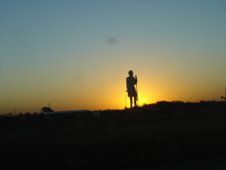Rusty Wier -- gone

The Fat Guy alerted me to the passing of Rusty Wier.
He wrote:
"Rusty was, indeed & absolutely, one of the originals. I count myself fortunate to have shaken his hand and thanked him for a lifetime of music.
Adios, mofo, and save me a seat at the bar."
The Fat Guy's ex had informed him earlier.
Michael Corcoran, the music writer for the Austin daily, wrote:
"Hearing was musician Rusty Wier’s last sense to go, so although he was unresponsive when surrounded by relatives and friends, including Jerry Jeff Walker, at his son Coby’s house in Driftwood Thursday night, he tried to raise up his head when the group sang “Amazing Grace.”
By the next morning the Austin musician, who had a hit when Bonnie Raitt covered his “Don’t It Make You Wanna Dance” on the soundtrack to “Urban Cowboy,” was dead after a two-year battle with cancer. He was 65.
“There’s this myth about the hippies and the rednecks meeting at the Armadillo and passing joints and Lone Stars to each other,” said John Inmon. “But the rednecks and hippies were the same people. That was Rusty. He was a redneck son of Central Texas, but he was also a hippie.”
Although Wier got his own chapter in Jan Reid’s “The Improbable Rise of Redneck Rock,” which chronicled Austin’s “progressive country” scene of the ’70s, Wier’s contribution to Austin music goes back to the mid-’60s. As a student at Southwest Texas State, the Manchaca-raised Wier was recruited to play drums in the Wig, a popular regional band assembled in the wake of the British Invasion. He later played drums and sang in the Lavender Hill Express, a country/ rock cover band. But he wanted to step out front.
“One day he just gave up the drums and started woodshedding on guitar,” said Inmon, who played with Wier in the trio of Rusty, Layton and John. “He locked himself in a room and practiced and practiced. He was a natural entertainer, so he could get his music across, but it took him awhile to get good.”
He established himself in the early ’70s as a folk singer with rock and roll eyes and a trademarked, low-crowned black hat. Along with Jerry Jeff Walker and Michael Martin Murphey, Wier was one of the first Austin acts to get a major label deal. But the clubs is where he made his money."














No comments:
Post a Comment